Suchergebnisse
Innovation in LARGE-SCALE
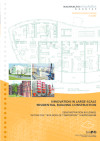
Demonstration buildings within the "BUILDING OF TOMORROW" subprogram
Forschungsforum
4/2006
Herausgeber: BMVIT
Englisch, 6 Seiten
Downloads zur Publikation
Cepheus Cost Efficient Passive Houses As European Standards
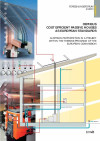
Austrian participation in a project within the Thermie-progra of the European Comission
Forschungsforum
2/2001
Herausgeber: BMVIT
Englisch, 6 Seiten
Downloads zur Publikation
Trends report 2015: Trends in Photovoltaic Applications. Executive Summary
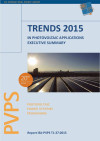
Der IEA-PVPS Trends Report gibt einen globalen Überblick über Photovoltaik-Technologieentwicklungen, den globalen Markt sowie die politischen Rahmenbedingungen weltweit. Ebenso wird die wachsende Rolle bzw. die Wettbewerbsfähigkeit der Photovoltaik in der Energiewirtschaft beschrieben.
Herausgeber: IEA Photovoltaic Power Systems Programme
Englisch, 64 Seiten
Downloads zur Publikation
Prefabricated Systems for Low Energy Renovation of Residential Buildings
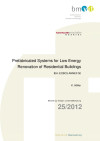
IEA: ECBCS-ANNEX 50
Schriftenreihe
25/2012
K. Höfler
Herausgeber: BMVIT
Englisch, 76 Seiten
Downloads zur Publikation
Rebuilding of the organic farm Achleitner, straw & clay - room climatisation with plants

Rebuilding of a marketing-, store- and processingcenter with an organic freshmart and an organic restaurant in passivhouse quality. Application of regional building materials, an innovatve overall energyconcept, climatisation with plants.
IEA Bioenergy Task 39 - An Examination of the Potential for Improving Carbon/Energy Balance of Bioethanol

Englisch
Innovative Coolant Lubricant Systems In Metal Cuttin
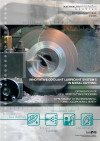
Optimization of High Speed Cutting Processes Improvement of Environmental and Occupational Safety
3/2006
Herausgeber: BMVIT
Englisch, 6 Seiten
Downloads zur Publikation
Macroeconomic Impact Of Renewable Energy Sources In Austria
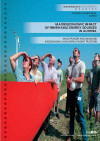
Wind Power and Biomass as Economic and Employment Factors
Forschungsforum
2/2003
Herausgeber: BMVIT
Englisch, 6 Seiten
Downloads zur Publikation
IEA Demand Side Management Technologies and Programmes - Annual Report 2014
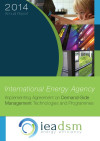
Herausgeber: IEA Demand Side Management Programme
Englisch, 138 Seiten
Downloads zur Publikation
Fuel Cell Systems - The Energy Technology Of The Future?
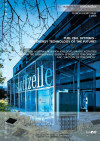
New Austrian Research and Development Activities Within The Subprograms "Energy Systems of Tomorrow" and "Factory of Tomorrow"
2/2008
Herausgeber: BMVIT
Englisch, 6 Seiten
Downloads zur Publikation
IEA Demand Side Management Technologies and Programmes - Annual Report 2013
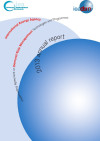
Herausgeber: IEA Demand Side Management Programme
Englisch, 116 Seiten
Downloads zur Publikation
Certified passive attic conversion of a typical building from the period around 1900
Conversion of an attic of a typical building from the period about 1900 to a passive attic with photovoltaic system and renovation of the existing building equipment. The aim is to keep the additional construction costs under 10 %, to avoid overheating in summer and to make possible a reproduction for the large amount of buildings from the same period.
11th European Roundtable on Sustainable Consumption and Production erscp
22. Jun 2007
Basel, CH
The 11th erscp is a three-day conference at the interface of science, industry, public authorities and politics. At the roundtable, an open and lively dialogue between all stakeholders will be fostered, bridging gaps and supporting further innovations.
Industrial Workshop: SHIP 2015 - Solar Heat for Industrial Processes day
15. September 2015
125 bis Avenue de PalavasMontpellier, FR
The event will give the floor to international experts and industrial players having deep knowledge and experience in dealing with solar heat and industrial processes. They will provide the final outcomes of their intensive work undertaken within the IEA-SHC Task 49.
Workshop: Power Electronics and Drive Train Technologies for future xEVs
16. April 2015
VDI/VDE Innovation + Technik GmbH, Steinplatz 110623 Berlin, DE
With this expert workshop the IA-HEV (Implementing Agreement Hybrid and Electric Vehicles) intends to assess the state of the art with regard to e/e-architecture and drive train technologies and discuss potential techniques for enhancing the overalls vehicle performance. The Expert Workshop will feature presentations by international and national experts.
Joined Workshop - Clean & Efficient Combustion with Advanced Motor Fuels (AMF)
6. November 2019
Montreux, CH
In the course of the AMF ExCo Meeting and the Combustion TCP Task Leaders Meeting, both taking place in Montreux, Switzerland early November 2019, both TCPs will jointly host a workshop. It will focus around low emission propulsion systems, novel fuels for advanced engine concepts, and new developments and trends.
ThermSat - pilot training program "Thermal renovation engineer in construction industry"
The goal was to design, offer, evaluate and refine a practical training, adapted to the current development. Aim of the courses is to have well-trained engineers and technicians with practical and theoretical knowledge in the field of thermal renovation of buildings.
BioLog II - Interregional Logistics- and Procurement Network for Forest Fuel in Austria
A concept for a cooperative forest fuel supply chain network for two regions of Austria is developed in order to minimise total system costs while simultaneously increasing supply guarantee for the plants. With results from previous projects and import data a concept for whole Austria is developed.
Biomethane - Status and Factors Affecting Market Development and Trade (2014)
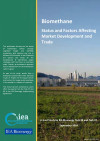
Die Studie gibt einen Überblick zum Status und anstehenden Herausforderungen im Hinblick auf das starke Wachstum der Biomethanproduktion, auf Basis von anaerober Gärung bzw. thermaler Vergasung, die Entwicklung eines Biomethanmarktes und den möglichen Handels dieses Bioenergieproduktes.
Herausgeber: IEA Bioenergie Task 37 und Task 40
Englisch, 92 Seiten
Downloads zur Publikation
Distributed power generation and intelligent networks
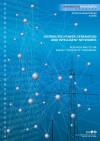
Research inputs for energy systems of tomorrow
5/2006
Herausgeber: BMVIT
Englisch, 6 Seiten
